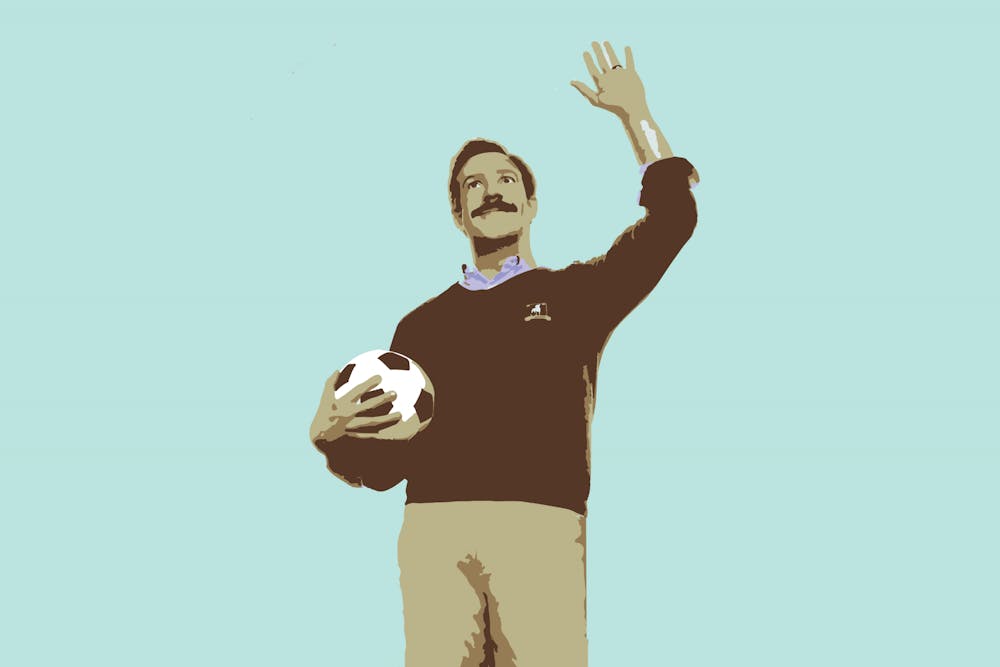Expectations are tricky things, and Ted Lasso—renewed and freshly serialized—has found itself beset by expectations from all sides.
Sports stories often struggle under the weight of the genre. At the end of every story, the protagonists either win or they don’t, and breaking the rigid conventions of the genre can only go so far. Sequels exist in an even more precarious position. When the final match is over—which feels like the most important thing ever, no matter how small the scope of consequence—and the characters have celebrated their victory or mourned their failure, there is little left to explore.
Ted Lasso's second season tries to fill the vacuum left by its critically acclaimed first season. AFC Richmond, coming off a heart–wrenching relegation at the hands of their former superstar Jamie Tartt and his new team Manchester City, strives toward promotion back to the Premier League. Ted Lasso, and all his cheery optimism, is back at head coach—this time, with most everyone around him buying into the Lasso philosophy.
At the start of the season, Ted Lasso struggles to meaningfully navigate conflict under both the genre’s ‘Where do we go from here?’ question and the specific limitations of its core philosophy. Ted Lasso exists in a sort of fantasy world like other socially conscious sitcoms such as Brooklyn Nine–Nine, ratcheted up another level with its unbelievable kindness. In these worlds, everyone casually refers to God as a woman, all men enthusiastically perform oral sex, or white people make offhand acknowledgements to the role of American imperialism.
Without any checks, suspension of disbelief starts to shatter. The idea of Dr. Sharon Fieldstone, a therapist, walking in as a cure–all for many of the team’s ills is touchy for Ted, but it also is for the viewer. When Sam Obisanya covers the sponsorship logo of a company exploiting his home country of Nigeria, the entire team and the club’s endearingly #GaslightGatekeepGirlboss owner, Rebecca Welton, rally behind him. The sponsorship issue also ultimately reintegrates Jamie Tartt into the team, as his former bullying of Sam and the team’s towel–boy–turned–assistant–coach Nate Shelley is forgiven when he supports Sam in covering up the logo.
These early conflicts and resolutions, almost oversimplifications, test the boundaries of what we see in the real world versus the world of Ted Lasso, and in many ways, the comparison is dissatisfying. The latter moment with Sam in particular generates a fierce cognitive dissonance between what we see onscreen and what we see in real life, where protests, even if supported by the players, are rarely encouraged by upper management or the leagues they compete in. Instead of inspiring a hopefulness for the goodness of humanity, as much of the first season does, the moment feels more out of touch.
Where Ted Lasso starts to shine again is when the show begins to explore the fault lines of its own hyperempathy. The show doesn’t shed its framework entirely, a decision which would remove a lot of what makes the show so compelling in the first place. Instead, Ted Lasso leans back into its strengths—the interiority of and the interpersonal relationships between the characters that drive the overwhelming love at the show’s core—while also reckoning with the possible limits of its philosophy.
Ted Lasso recenters on the figure of the father, a turn which takes place around the fifth or sixth episode. As the episodes progress, Jamie tries to become his own person as he stands against his father’s abuse. Rebecca negotiates with her father’s death. Ted reveals that his father died of suicide. The accretion of things left unsaid builds to a peak during the funeral of Rebecca’s father in the tenth episode: Rebecca explains to her mother about how she witnessed her father cheating, which is cut together with Ted explaining to Sharon about witnessing his father’s suicide, as they both espouse a simultaneous love and hate for the complicated figures in our lives who we are tied to, whether we want to be or not.
As Ted begins to engage with Sharon more, Sharon’s interiority is realized, rather than her serving as a panacea for all the team’s woes. We get to see her own worries about being vulnerable or possible struggles with alcohol at the same time that we finally get to see Ted apart from his typical unflappable cheeriness. Ted Lasso successfully reconnects with what made its empathy believable and desirable.
Of course, Nate comes through most sharply in all of this, as he suddenly provides a case study of someone for whom this kindness doesn’t work. His evolution from towel boy to disgruntled assistant coach also doubles as a counterexample to the show’s entire philosophy as his hatred for Ted grows.
The arc is methodically done, as he goes from unconfident, to proud, to feeling overlooked, to desiring more, to becoming the head coach of West Ham United. Much of his struggle is, again, tied up in his father, whom he feels he can never impress. He’s not a villain from the start like Rupert Mannion, Rebecca’s ex–husband, generally wretched human being, and now Nate’s boss—he’s someone who came from Ted’s system yet ultimately doesn’t (stylized in all caps, as is necessary for Ted Lasso’s motto) BELIEVE.
Not everything is perfect even in Ted Lasso’s second half, particularly in the romantic relationships. The conflict between Roy and Keeley was one of the slowest parts of the show (Another question: How do you make a happy couple interesting?), and the relationship between Sam and Rebecca—well, it’s probably deeply unethical, considering that this is a relationship between an athlete and his employer.
But Nate is unexplored territory. His storyline does something new. It becomes an answer to the question that cropped up, especially after the first few episodes stalled: Where can the show go from here?







